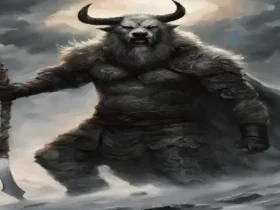Greek mythology is full of powerful deities and heroic figures, but one group of deities stands out above all the rest: the demigods. These are divine beings who are half human and half divine, and they often wield extraordinary power. From Achilles to Zeus, here’s a look at the most famous demigods in Greek mythology.
Note: We try to cover all mentioned demigods from different Greek mythology literatures.
1 Achilles
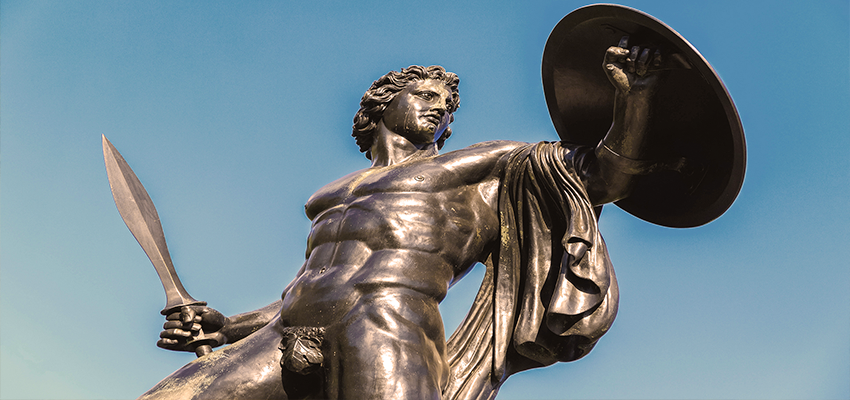
Achilles was the great hero of the Trojan War. Achilles was the bravest and most valiant of the Greek demigods. He was born to the goddess Thetis and the god Peleus. He was known for his incredible strength, speed, and stamina. Achilles was also known for his rashness and his propensity for leading from the front in combat.
2 Amphion

Amphion was the son of Zethus and Antiope and twin brother of Zethus. He was a great hunter, but most famously, he was the guardian of Thebes. Amphion was also a great musician and played so well that he was able to move stones to form a wall around the city of Thebes With his music. He married with Niobe and after Amphion’s wife and childrens died he became depressed and killed himself.
3 Agenor
Although the family line of Agenor is not clearly mentioned anywhere, he had a lot of different relatives, most commonly being said to be the son of Poseidon and Libya. Many also supposed that he had a twin brother who was named Belus.
Mythology writers later added the two other siblings of Agenor: Cepheus and Phineus. His sons were supposed to be ancestors of Theban kings, Cilician kings and Pho, Phoenician kings.
4 Heracles (Hercules)

Heracles was the son of Zeus and a Greek Mythology demi-god with superhuman strength. A symbol of the ultimate masculine power, Heracles became an inspiration for this nation’s heroes. Heracles had three human parents during his childhood, two of which were mortal and one which was divine. Hercules was one of the most powerful heroes of Greek mythology and was famous for his masculinity, strength and courage.
5 Orion

According to Greek Mythology, Orion was the son of the god Poseidon and Euryale, the daughter of Minos who was king of Crete. Orion was able to walk on water, which allowed him to reach the island of Chios. He was often thought to be one of the great huntsmen of his times, but he died from the bow of Artemis, the Goddess of the Hunt and then after Zeus sent him to heaven.
6 Orpheus
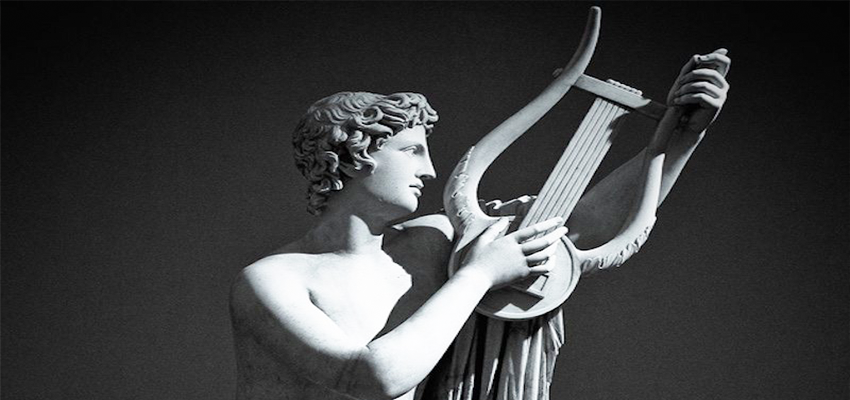
Orpheus was the son of Apollo and Calliope and he was a great musician or poet. According to Greek mythology, it was Apollo, one of Orpheus’s favorite gods, who taught him how to play when he was only 13 years old. His music had the power to charm animals and make trees dance.
It is said when Orpheu’s wife died and when he found his wife’s body, Orpheus started singing sorrowful songs, as the nymphs and the gods started to weep, they advised him to go to the Underworld and bring her back.
7 Perseus

Perseus was one of the considerable heroes in Greek mythology. The son of Zeus and Danae, who was a half-god by birth. He was an important and intelligent king who founded the Mycenae kingdom, as well as the Perseid empire of the Danaans. He was the greatest Greek hero before Heracles and defeated monsters like Cadmus and Bellerophon. It is said that he killed the evil Gorgon Medusa who winged human females with living venomous snakes in place of hair.
8 Theseus

There is much myth and legend surrounding the figure of Theseus, one of the most famous demigods in Greek mythology. Born to the mortal princess Aethra and Poseidon, Theseus was a valiant young man who proved himself time and time again in battle. He is credited with helping to bring about significant change in the society, and was even considered to be wise and powerful.According to Greek legend, Theseus was the founder king of Athens and was also considered the patron deity of the city.
He is said to have been especially violent towards those who hurt or threatened the people he loved. He is best known for defeating the Minotaur, a monster that lived in a labyrinth on the island of Crete.
9 Autolycus
Autolycus, the son of Hermes and Chione, married either Neaera or Amphithea and he had two daughters. One of them, Anticlea and second Polymede would later become the mother of Jason. It is believed that Autolycus was the master thief and this skill was given by Hermes, Autolycus’ father, who had been revered for his many uses of trickery and trickster skills. This ability enabled Autolycus to better change his appearance and take off anything that he wanted to steal. The ability enabled him to become a highly skilled thief.
When Autolycus was very young he lost his mother then he spent his childhood with his older brother, Malacus.
10 Arcas
Arcas was the son of Zeus and Callisto, whom Hera turned into a bear. Although Arcas was the father of at least three sons, Apheidas, Azan and Elatus, there are still a number of other children named such as Autolaus, Deiomeneia, Erymanthus, Hyperippe, Pelasgus and Triphylus.
Arcas is said to have been a good king and introduced agriculture, bread making, and basket weaving to the citizens of the kingdom. Arcas was also a hunter in his time, who became king of Arcadia. He had learned the agricultural art from Triptolemus, who was a disciple of Demeter.
11 Helen of Sparta (and of Troy)

Helen of Troy was the daughter of Zeus and Leda and was also the most beautiful woman from the time of heroes in Greek mythology. When Helen was twelve, Theseus the Greek hero kidnapped her and planned to marry her. He took her to Attica in Greece, where under the care of his mother he locked her away. After Polyxo met Helen, legend has it that she had Helen hanged for revenge for her husband’s death. She is mostly known for the part she played in causing the Trojan War. Helen was the wife of Menelaus who was The King of Sparta.
12 Aeneas

He was the son of Prince franchises and Aphrodite, the Greek goddess of love and beauty. He became the first king of Rome after the fall of Troy. According to legend, Aeneas took an active part in the Greco Trojan War, but he was on the side of Troy and was said to have been destined for greatness and greatly favored by the gods, most notably from his mother Aphrodite, who often protected him from danger during the Trojan War.
13 Epaphus
He was the son of Zeus and was greatly loved by his father. He later had to pay dearly for that love. Epaphus was also the father of Libya. He was famous for turning himself into a cow in Other to escape the wrath of his stepmother Hera. Epiphus wandered the Earth to find shelter from her jealousy.
14 Triton
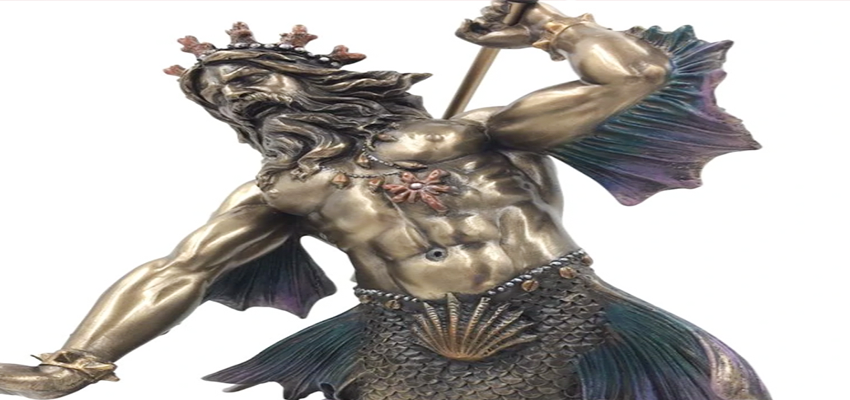
Triton, the son of Amphatrite and Poseidon, the Greek god of the ocean. Triton was specifically known as the messenger god responsible for delivering his father’s messages. His abilities were basically controlling the calmness and movement of the ocean waves with his horned seashells. He was usually described as half human, half fish, and spent most of his life with his parents in the deepest part of the ocean, and is often credited as Poseidon’s true heir.
15 Asclepius

He was a son of the sun god Apollo and a human mother unlike other demigods. Asclepius was less of the warrior type. He was more interested in his healing arts and medicine. He was later raised by his father Apollo after the death of his mother and personally trained and encouraged in his healing abilities. He later started traveling the world, learning, teaching and healing others. He eventually mastered his arts to the point that most of the supreme gods such as Hades and Zeus became fearful and envious of him.
It was rumored that he later gained the power to raise the dead and bring them back to life, an ability Zeus and the other top gods never possessed. Zeus’s jealousy grew to the point he later struck Asclepius dead in other to stop him from teaching humans this ability. When his father Apollo heard what had happened, he rebelled against Zeus and demanded that Zeus give Asclepius a seat in Olympus as one of the gods with his abilities in healing and medicine.
16 Hippolyta
Hippolyta, daughter of Ares, the Greek god of war, and Otrera, queen of the Amazons, a strong race of women who only existed on an isolated island in the Black Sea. She was best portrayed in the DC film as the mother of the popular character Wonder Woman.
17 Zagreus

Zagreus, the son of Hades, the Greek god of the Underworld and Persephone. He was most often referred to as the Prince of the Underworld. Zagreus is best known for being the rebellious son of Hades, who always felt wrong with his father, often feeling that he must live up to his father’s reputation as the god of the underworld. He tried several times to escape the underworld, in other to find his mother, but failed countless times. He was known for his touchiness and a good sense of humor.
18 Aeacus

He was the son of Aegina and Zeus who was God of Greek and daughter of the river god Asopus. Aeacus was the prominent king of the island of Aegina, which was named after his mother. Aeacus judges with Rhadamanthus and Minos those who have died for their wrongs and goods in the underworld.
19 Belus
According to ancient myths, Belus was the son of Libya and Poseidon, a kingdom that he named after his mother and Egypt and he was also a descendant of the river god Inachus. Danaus and Aegyptus were the two most famous sons of Belus.
20 Cadmus

The king of Thebes or founder in Greek mythology was named Cadmus and was the son of King Agenor and Queen Telfassa, and brother of Phoenix, Cilix and Europa and also believed to be the first recorded deity of Greek mythology. It is said that he introduced the Phoenician alphabet to the Greeks who then conditioned it into their own. Cadmus was a legendary, powerful warrior who traveled all over the world, fighting monsters and being transformed into a serpent.
21 Castor And Pollux
Castor and Pollux were the twin sons of Zeus, the god of sky and thunder, and Jupiter. The twins, who were mythological figures in Greece, were known as Kastor and Polydeukes in Latin. In Greek mythology, they were the twin brothers also known as the Dioscuri, meaning ‘youths of Zeus’. It is believed that When Castor and Pollux’s sister, Theseus abducted Helen, his brothers took her back to Sparta and told the ruler Aegeus’s wife Aethra was a hostage for good measure.
22 Chrysaor
Chrysaor was the son of Poseidon and the Gorgon Medusa. He was the brother of Pegasus who was a winged horse. According to Greek Mythology, When Perseus cut off Medusa’s head, Pegasus was born and Chrysaor also came into the world at the same time. Nothing is special known about him but he was considered a strong-willed warrior, and his name means “he who bears a golden sword”. He does not have a major role in Greek mythology.
23 Cycnus
Cycnus was the son of Pelopia and Ares. Cycnus was married to Procleia, a daughter of King Laomedon of Troy and after Cycnus and Procleia became parents to a son and a daughter, Tennes and Hemithea. In the Trojan War, Cycnus was a prominent character. He was famed for being invulnerable to sword and spear, but he would later be killed by Heracles. Cycnus’ son Tennes also died during the Trojan War.
24 Dardanus
According to Greek mythology, Dardanus was the son of the goddess Electra and God Zeus. He was also the mythical founder of the city of Dardania. The first king of Troy was the father-in-law of the king who ruled over people later known in mythology as Trojans. He founded a city and named it after himself. Later, this city became known as Troy which was the name of his grandson. Dardanus and his brother Laogonus, were slain by the hero Achilles during the Trojan war.
25 Dionysus
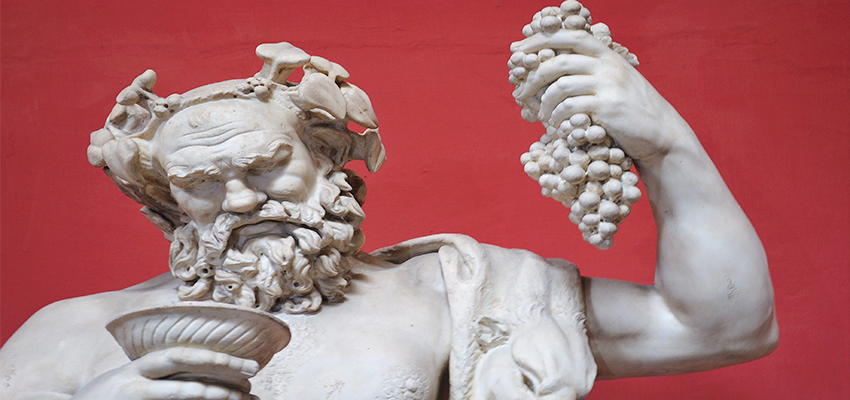
Dionysus was the son of Zeus and Semele, a daughter of Cadmus and Harmonia. Dionysus was the god of winemaking, orchards and fruit, vegetation, fertility, insanity, ritual madness, grapes harvest, religious ecstasy and festivity in ancient Greek religion and myth. Dionysus is one of the few people who can revive a dead person and bring them back from the underworld.
26 Epaphus
Epaphus was the son of Zeus and Io, born in a unique way. His name means “touch.” That represents the way he was borned because he was borned by Zeus’ touch. Epaphus was a powerful King of Egypt in Greek mythology. The king of Egypt was born either on the island of Euboea or in Egypt, on the river Nile. Epaphus, the king of Egypt died during a hunting trip, which was instigated by Hera, who was jealous that the son of her husband was succeeding.
27 Lacedaemon
Lacedaemon was the son of God Zeus and the Pleiad nymph Taygete. In mythological legends, he was the celebrated king of Laconia and the father of Spartan King Amyclas. He had two sons, a son called Amyclas and a daughter called Eurydice.
28 Minos
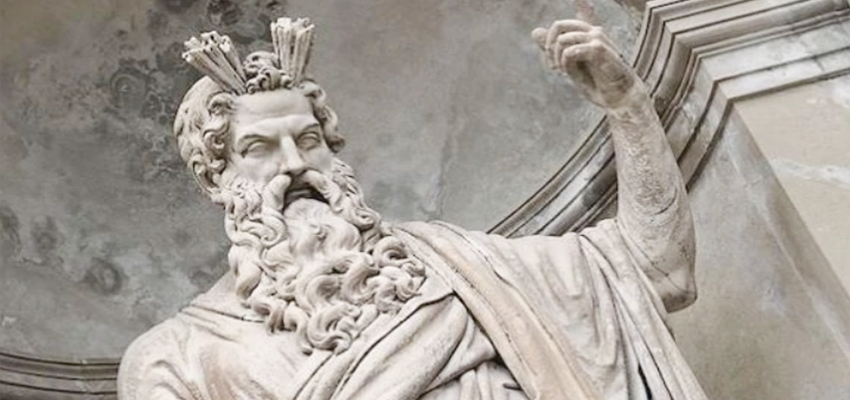
Minos was the son of Zeus and Europa, who was Phoenician princess of Argive Greek origin. Minos was a mythical king in the island of Crete and was famous for creating a successful code of laws. His laws were so successful that after his death, Minos became one of the three judges in the underworld. The success of Crete during his time inspired many people to build a powerful navy and developed an excellent educational system. Minos was killed by King Cocalus’ daughters.
29 Memnon
Memnon was the son of Tithonus, the prince of Troy and Eos, the personification of the dawn. According to myths after he grew up he became the king of the region of Ethiopia. It is said when Memmon died, The gods collected all blood from Memnon and made a river that smelled of human flesh on the anniversary of Memnon’s death. Zeus was said to be truly hurt after his death and therefore gave him immortality.
30 Neleus
When he was born out of marriage, his father was Zeus, and his mother Poseidon, left him on a mountain and thereafter Neleus was raised by a maid. Neleus was a twin brother of Pelias who was king of Iolcus in Greek mythology. Neleus married with Chloris and their four sons include Pero, Periclymenus, Alastor, and Nestor. Heracles later asked Neleus to forgive him for killing his father and other sons. After being refused, Heracles killed Neleus and all his sons except Nestor.
31 Pelias
Pelias was the son of the god Poseidon and daughter of King Salmoneus of Elis and Alcidice, Tyro. Pelias was the king of Iolcus, an ancient city and a modern village in Magnesia, Thessaly, Greece. He married Anaxibia and Phylomache, had a number of sons, Pisidice, Alcestis, Hippothoe, Acastus and Antinoe and after years Pelias was killed by Medea, the daughter of King Aeetes because Pelias refused to give up his throne.
32 Pirithous
Pirithous was the son of Zeus and Dia, a goddess venerated by Phlius and Sicyon. Pirithous was in Greek mythology, the king of the Lapiths and husband of Hippodamia. He was also a friend of Theseus and close to him. His mother was called Dia, while his father was usually Ixion or Zeus. Pirithous, one of the most famous Greek gods, was known for defeating the centaurs in single combat, helping Theseus abduct Helen from Sparta, and looking for a new wife. Some say that he ended his days in the Underworld, while others say that he was killed by a dog.
33 Rhadamanthus
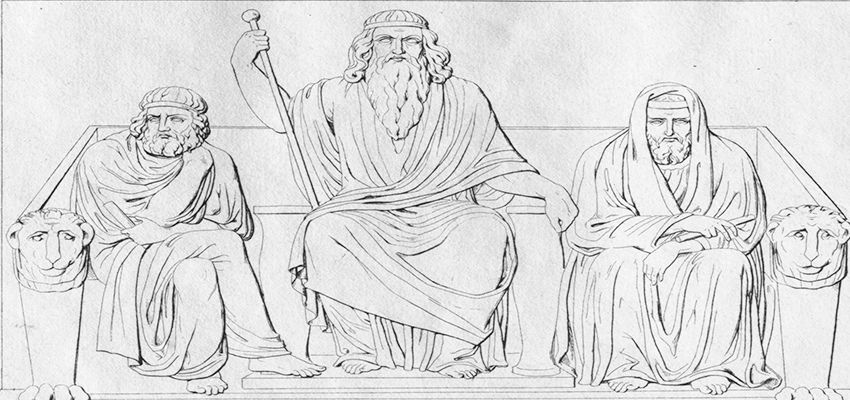
In Greek mythology, Rhadamanthus (; Ancient Greek: Ῥξαδαμαντίος, Rhadamandīs) was a third judge of the dead (underworld of dead). He is principally known from the myth of Prometheus, in which he allowed the Titan to remain bound to Mt. Caucasus for stealing fire from Zeus.
34 Sarpedon
In Greek mythology, Sarpedon (Sarpedonus in Latin antiquity) is brother to Agamemnon and Menelaus in some sources (while Minos and Rhadamanthus were depicted as brothers in the Iliad book).
According to the ancient poem “Illiad”, Zeus and Laodamia were depicted as the parents of Sarpedon but later in other versions, Zeus and Europa were described as the exact parents of Sarpedon. Sarpedon was a Lycian hero who fought on the side of the Trojans in the Trojan War.
35 Tityos

Tityos was the son of Elara and Zeus. Tityos was a giant with the body of a man. It was supposedly said that Tityos, who was also called Tityus, covered 9 acres of ground while had a height of 9 plethora, so roughly 900 feet. Tityos son Apollon quickly intervened and slew him because he raped the goddess Leto. He fell into the River Styx (a dark underworld river) and was eventually devoured by two vultures (the gorgon Medusa later turned him into stone) to eat his liver.
36 Semele
Semele was the daughter of the Greek hero Cadmus and the goddess Harmonia. She is responsible for the world’s first god child, Dionysus. Semele was only ever a mortal mother during her life and became the guardian of god. Semele was a princess of Thebes. Zeus killed the svelte women Semele and before her body was cold, Zeus had taken hold of the six-month unborn child and patched it on his thigh.
37 Pentheselia
Penthesilea was the daughter of the ancient Greek god of war, Ares and the Amazon queen, Otrera. Pentheselia was also sister to Hippolyta, who married Theseus after he conquered her during a battle. Legend has it that Pentheselia was raped by Achilles. But some ancient Greek story tells us that Achilles would have returned the body of Penthesilea to Troy. Moreover, it has even been said that Achilles was in love with the deceased Penthesilea.
38 Harmonia

In Greek mythology, Harmonia was the daughter of Ares and Aphrodite. But according to Theban accounts Harmonia was the daughter of Zeus and the Pleiad Electra. She was abducted by Cadmus, the founder and first king of Thebes, who married her off with mortal all the gods honored the wedding with their presence and after Harmonia had 6 childrens.
Harmonia’s story depended on the cursed necklace that Harmonia received on her wedding day is widely known. Harmonia married Cadmus, who gave her a robe and a necklace, which he had either received from Hephaestus or from Europa. However, the curse was inherited by Harmna’s descendants and brought misfortune to them all.




